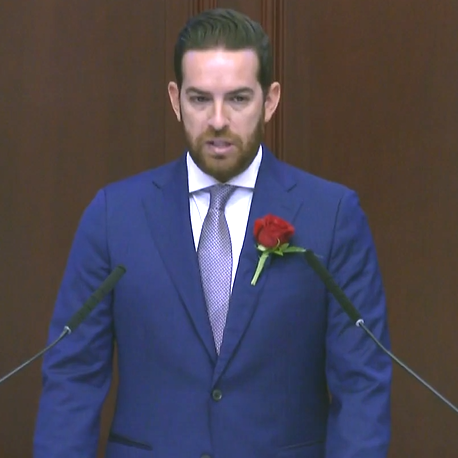A multi-bill effort led by attorney lawmakers in the Florida House of Representatives would roll-back many property insurance litigation reforms passed in the 2022-2023 legislative session. Those reforms are reminiscent of the Workers’ Compensation insurance reforms passed in the early 2000’s that today has Florida boasting one of the lowest workers’ comp rates in the country.
Former Florida Deputy Insurance Commissioner Lisa Miller talks with Jon Shebel, former President & CEO of Associated Industries of Florida who led the workers’ comp efforts. Shebel draws direct comparisons between both reform efforts, argues that the proposed bills this session don’t help consumers, and urges the legislature to listen to the data, as it did with workers’ comp, that shows property insurance reforms are working to reduce homeowners insurance rates.

Jon Shebel, former President & CEO, Associated Industries of Florida
Show Notes
Jon Shebel recounts his role in Florida’s 2003-2005 workers’ compensation reforms, which capped attorney fees and streamlined claims, reducing rates from the highest to among the lowest in the U.S. Florida’s rates have dropped for the eighth consecutive year.
“The biggest issue was litigation,” explained Shebel, on the reason for high workers’ comp insurance rates. “Plaintiff attorneys had free rein to convince injured workers to sue their employers, often leading to drawn-out cases that weren’t necessarily in the workers’ best interest. There were cases where legal fees ended up costing more than the actual medical treatment and benefits for the injured worker.”
Shebel said that very same incentive to sue contributed to Florida having the highest property insurance rates in the country between 2017 and 2023. By 2021, Florida had 8% of all homeowners’ claims in the U.S., yet 76% of all homeowners’ claims lawsuits, according to the Florida Office of Insurance Regulation. Likewise, a 2021 report titled Florida’s P&C Insurance Market is Spiraling Toward Collapse revealed that “Of the $15 billion spent on litigated claims since 2015, only 8% was paid to policyholders. Plaintiff attorneys got 71% with the remaining 21% spent by insurance companies on defense attorneys.”
Shebel said Florida’s property insurance reforms took a lesson from its workers’ compensation insurance reforms 20 years earlier.
“Our strategy in workers’ comp was to address the root cause, plaintiff attorney involvement. The main provisions included capping attorney fees, streamlining the claims process, and implementing stricter guidelines to prevent unnecessary lawsuits. This not only reduced legal costs but also ensured that injured workers got the benefits they needed faster, without the delays that litigation often caused,” Shebel said. All the dire predictions that the reforms would hurt workers didn’t come true, he added.
Host Miller referenced “the inconvenient truth for the trial bar” is that the 2022-2023 property insurance reforms are working in bringing down homeowners and automobile insurance rates, as evidenced by a March 2025 presentation by Florida Insurance Commissioner Michael Yaworsky, titled “Florida’s Tort Reform.” It shows that all indicators are heading in the right direction as new rates make their way into policies statewide. Florida homeowners insurance rates continued their decline in 2024, ending the year with a net industry average decrease for the first time in two years.
On the podcast, Miller and Shebel listened to part of a media interview from former Insurance Commissioner David Altmaier, outlining what Miller likened to “a game of whack-a-mole” where as soon as one vendor and litigation abuse is exposed and later resolved through regulation, another one pops up. In the interview, Altmaier traces the successive history of excessive litigation, beginning with mold claims 20 years ago and progressing through sinkhole claims, water claims, and finally roof claims that prompted the legislature to pass initial reforms.
“What everybody in the regulatory environment in Florida has said, and it’s true, is that what happens in every legislative session is that the trial lawyers come in, in every line of insurance, with bills not to represent the injured party, but to represent their pocketbooks,” Shebel said in response to Altmaier’s comments. “They try to amend every insurance law that they can to increase their opportunity to have an unfair advantage to sue the insurance carriers.”

Governor Ron DeSantis. Courtesy, The Florida Channel
Host Miller noted there are a series of bills (see Show Notes below) progressing through the Florida House of Representatives that would repeal many of the 2022-2023 property insurance reforms and/or allow more insurance litigation. Although the Florida Senate has shown no indication to go along with any of them and Governor DeSantis has threatened to veto any measure that would reverse the positive market momentum of the reforms, Shebel warned caution.
“In the final two or three days of the legislature, there’ll be amendment after amendment that they try to sneak on to various bills to do the same thing. It’s what the trial lawyers do every session. It never stops. It never ends,” he said.
Shebel said the key to succeeding on workers’ comp reforms in the early 2000’s was using relevant historical data. “The legislators just need to look at data. The data tells the story. They ought to ask people, ‘Show me your data. I want to see the data on this.’ And if you look at the data, it tells the story, as you well know as one of the former key regulators,” he told host Miller.

House Speaker Daniel Perez. Courtesy, The Florida Channel
Shebel also advised there are broader issues that the Florida Legislature should consider, including conflict of interest and consolidating various attorney fee statutes into one chapter of law. House Speaker Daniel Perez (R-Miami) is an attorney. Rep. Hillary Cassel (R-Dania Beach), sponsor of HB 1551 that would essentially undo the 2023 session’s elimination of one-way attorney fees in insurance lawsuits, is a plaintiff attorney who sues insurance companies.
“It is, you know, unethical for legislators to vote on issues that directly affect them financially, but they do it time after time, and they ought to really enforce that rule,” Shebel said.
Host Miller brought up the documented bad behavior by some plaintiff lawyers – the poster child being Scot Strems of the former Strems Law Firm of Coral Gables who was permanently disbarred by the Florida Supreme Court in 2022 and later settled a $1 million RICO lawsuit brought by Citizens Property Insurance. “(It was) showing unequivocally what he was doing in terms of being a cottage industry in and of itself, and just throwing 1,000s of lawsuits at the wall, hoping that they would stick,” said host Miller.

Scot Strems from the Florida Trend article Attorney Scot Strems is the ‘poster child’ of the insurance crisis, August 24, 2022. Courtesy, Florida Trend
Shebel said Strems is the only lawyer he knows that was so sanctioned in the past 20 years, noting the Florida Supreme Court should more strongly regulate lawyers. “The Supreme Court handed over the daily regulation of lawyer activity to the Florida Bar. That was probably not the right thing to do, but the Florida Bar now is the one who does all the investigations and so forth, then they take it to the Supreme Court who takes the final action. But the Supreme Court ought to take issue with all this and they should now look at the practice of law in Florida, and they should issue some more stringent regulations to stop all this stuff. They haven’t done that in the last 50 years.”
Host Miller noted that one big issue that’s been overlooked is the continued lack of transparency over attorney fees that are figured into the total cost of the insurance claim, as required under the 2022 reforms.
Shebel also suggested the legislature consolidate all lawyer fees laws into one chapter in Florida Statutes for efficient regulation. “Take it out of all the various insurance sections of the law which are spread all over the place, and put all the fees in one chapter, so it can be looked at in one place, relating to all the areas of the insurance code, because you can’t keep up with all these bills and amendments that come flying out of nowhere.”
Host Miller and Shebel also discussed the lesson that Florida property insurance companies today can make sure they’ve taken away from the workers’ compensation insurance tumult from 20 years ago.
“Things got so bad, all the workers’ comp companies pulled out of Florida, and we as an employer association, started our own company,” Schebel explained, referring to Associated Industries Insurance. “We immediately installed a section within the company that when people called, they listened, and we resolved a lot of injured workers’ problems. When they called, we said, ‘Whoops, yeah, we didn’t do this right,’ or ‘We made a mistake,’ or ‘We didn’t know that,’ and we resolved the issue right there. Of course, that didn’t stop the litigation. They sued on everything. People should call their insurance company first when they have a problem. I think it’s important for the (property insurance) carriers that they have a true system within their own company to listen to people,” Shebel advised.
Host Miller commented that “good policy just doesn’t happen by accident. It takes a lot of hard work, good data, and a willingness to challenge the status quo. Where, two years ago, we saw double digit increases, we’re not seeing that anymore. All indicators are heading in the right direction as new rates make their way into policies.”
Links and Resources Mentioned in this Episode
OIR Approves Further Reduction in Workers’ Compensation Insurance Rates for Eighth Consecutive Year (Florida Office of Insurance Regulation, November 18, 2024)
Key Provisions of 2022 Insurance Consumer Protections & Market Reforms and 2023 Reforms (Lisa Miller & Associates)
Letter from Florida Insurance Commissioner David Altmaier to House Commerce Committee Chairman Blaise Ingoglia on property insurance litigation rates (Florida Office of Insurance Regulation, April 2, 2021)
Florida’s P&C Insurance Market is Spiraling Toward Collapse (by Guy Fraker, Cre8tfutures Advisory, April 2021)
Florida’s Tort Reform presentation (Florida Office of Insurance Regulation, March 2025)
Homeowner insurance costs fell by 0.7% in fourth quarter of 2024 (South Florida Sun Sentinel, March 20, 2025)
Insurance Commissioner David Altmaier explains to media why roof claims have become just the latest driver of high homeowners premiums in a decades-long insurance litigation problem (The Florida Channel, March 29, 2022)
Bills before the 2025 Florida Legislature that would repeal many of the 2022-2023 property insurance reforms and/or allow more insurance litigation:
- HB 1551 essentially re-instates the one-way attorney fee law, which guaranteed lawyer fees for those suing property insurance companies and winning as little as one-dollar over the initial settlement offer.
- HB 1047 is a wide-ranging bill that touches on various aspects of Florida’s insurance laws and includes a provision making it easier for liability lawsuits to be filed.
- SB 1256 & the identical HB 1181 would do away with Personal Injury Protection (PIP) coverage under Florida’s No-Fault insurance law and replace it with bodily injury (BI) liability coverage. So after an accident, the victim could sue the offending driver directly rather than their insurance company.
- HB 1437 & the identical SB 1840 provides that prevailing parties in lawsuits by health care providers for overdue medical benefits under PIP would be entitled to attorney fees & costs.
- HB 947 would reverse the 2023 tort reform legislation by repealing parts of the accuracy in damages law while changing other parts.
Florida Statute 624.424 (11)(p)(q) requires companies to note the amount paid for the claimant’s attorney and that attorney’s expenses for each closed claim.
Florida Bar Rule 4-1.5(f)(5) requires a lawyer to prepare a closing statement upon the conclusion of a contingent fee case, itemizing costs, expenses, and fees, signed by the lawyer and client.
Attorney Scot Strems is the ‘poster child’ of the insurance crisis (Florida Trend, August 24, 2022)
Three Different Leaders, Three Different Opinions (LMA Newsletter of April 7, 2025)
Florida’s insurance reforms are working, let them take effect. (by former Florida Insurance Commissioner Kevin McCarty in Florida Politics, March 3, 2025
Commissioner Mike Yaworsky Highlights a Year of Improvement in Florida’s Insurance Industry (Florida Office of Insurance Regulation, January 8, 2025)
Property Insurance Stability Report (Florida Office of Insurance Regulation, January 1, 2025)
Assignment of Benefits & Insurance Litigation Reforms (Lisa Miller & Associates)
Florida Property Insurance Market Stats, Data and Facts (Florida Office of Insurance Regulation)
Subscribe to the LMA Newsletter and The Florida Insurance Roundup podcast (free)
** The Listener Call-In Line for your recorded questions and comments to air in future episodes is 850-388-8002 or you may send email to [email protected] **
The Florida Insurance Roundup from Lisa Miller & Associates, brings you the latest developments in Property & Casualty, Healthcare, Workers’ Compensation, and Surplus Lines insurance from around the Sunshine State. Based in the state capital of Tallahassee, Lisa Miller & Associates provides its clients with focused, intelligent, and cost conscious solutions to their business development, government consulting, and public relations needs. On the web at www.LisaMillerAssociates.com or call 850-222-1041. Your questions, comments, and suggestions are welcome! Date of Recording 4/16/2025. Email via [email protected] Composer: www.TeleDirections.com © Copyright 2017-2025 Lisa Miller & Associates, All Rights Reserved

